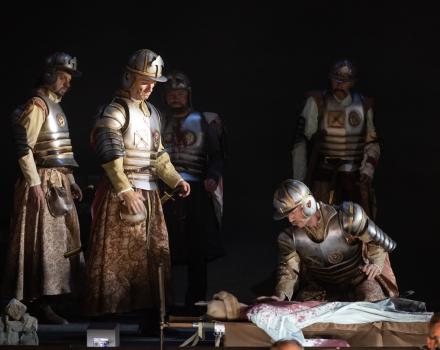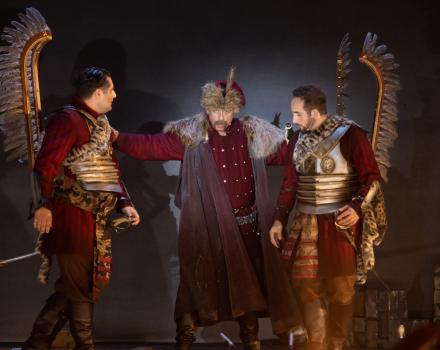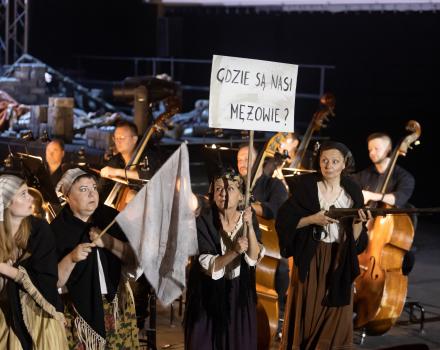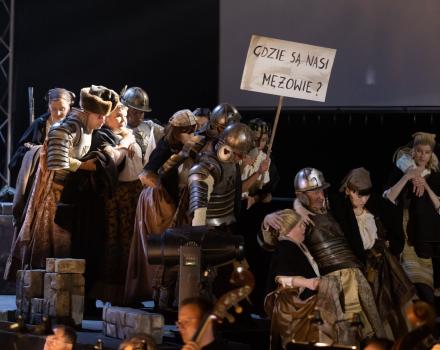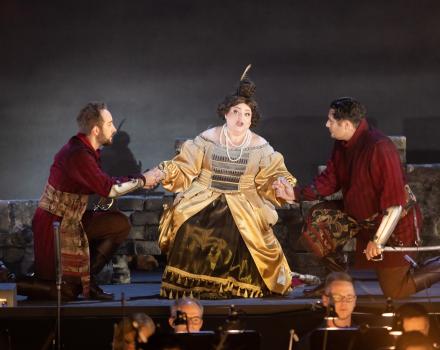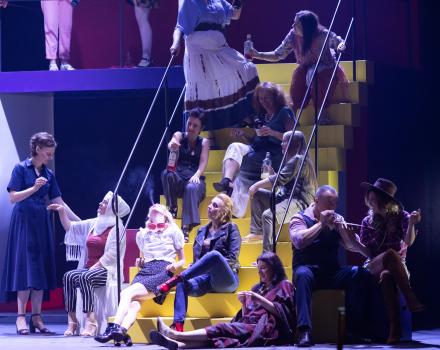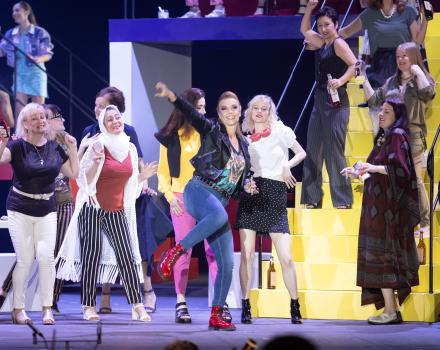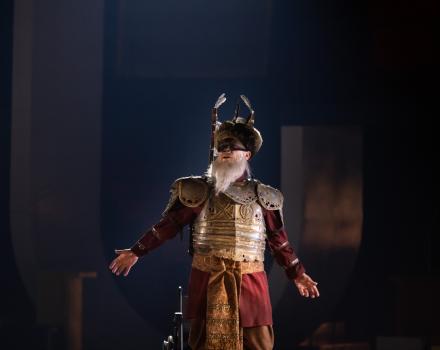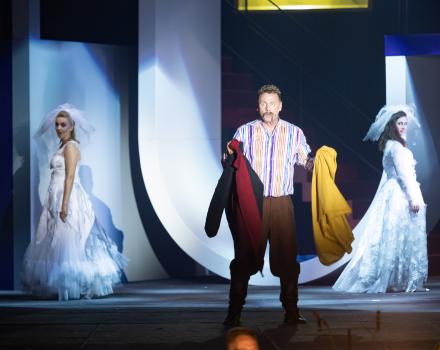

After returning from the war, two brothers resolve never to marry so that they can serve their country. But they find their match when they meet two strong-willed sisters living in a mysterious manor.
Considered a jewel of 19th-century Polish opera, Stanislaw Moniuszko’s The Haunted Manor remains largely unknown abroad. Full of melodic inventiveness, bel canto inspiration and unique local colour, it certainly deserves a wider audience. After David Pountney’s production for Polish National Opera (streamed on our platform in 2015), Poznań Opera's resolutely modern production - directed by the winner of the European Opera Directing Prize Ilaria Lanzino - should help find more admirers for Moniuszko’s masterpiece.
Cast
Hanna | Ruslana Koval |
|---|---|
Jadwiga | Magdalena Wilczyńska-Goś |
Stefan | Piotr Kalina |
Zbigniew | Rafał Korpik |
Miecznik | Stanisław Kuflyuk |
Skołuba / Villager | Damian Konieczek |
Cześnikowa | Anna Lubańska |
Maciej | Jaromir Trafankowski |
Damazy | Szymon Rona |
Marta | Julia Mech |
Old Woman | Marcelina Górska |
Grześ | Bartłomiej Szczeszek |
Beloved of Skołuba | Karolina Pytlak-Zdrojkowska |
Beloved of Damazy | Olaf Przybytniak |
Chorus | Poznań Opera House Choir |
Orchestra | Poznań Opera House Orchestra |
| ... | |
Music | Stanisław Moniuszko |
|---|---|
Conductor | Marco Guidarini |
Director | Ilaria Lanzino |
Sets | Leif-Erik Heine |
Lighting | Wiktor Kuźma |
Text | Jan Chęciński |
Chorus Master | Mariusz Otto |
Musical assistants | Katarzyna Tomala-Jedynak, Rafał Kłoczko |
Assistants to the director | Bartłomiej Szczeszek, Andrzej Ogórkiewicz, Marta Dorożalska |
Assistant choreographer | Evgeniia Meissner |
Dancers | Poznań Opera House Ballet |
| ... | |
Video
The story
Act 1
The brothers Stefan and Zbigniew return to their hometown after the war. After their war experiences, the two brothers decide to take an oath to ban women from their homes. They want to remain single and live without obligations so that they can fight and serve their country at any time. Their first challenge to the oath, however, is their stubborn aunt Cześnikova, who has already arranged a wedding with two girls of their choice, whom they firmly reject. When Cześnikowa learns that her nephews are planning to go to the Kalinów estate to collect some of their dead father's debts, she is stunned, fearing that Stefan and Zbigniew might fall in love with MIecznik's daughters Hanna and Jadwiga.
The clever woman starts to counteract this possibility immediately – she tells Zbigniew and Stefan that the Kalinów manor is a cursed, dangerous place that will cause anyone who goes there to die a sudden, violent death. The young men laugh off their cunning aunt’s story.
Act 2
Meanwhile, the atmosphere in Kalinów is serene and festive. It is the last day of the year. The girls intend to engage in fortune-telling – each of them wants to know her future and possible love. Jadwiga hums a song called Dumka about her dreams for the future. The women engage in pouring wax. They interpret the shapes it takes after cooling. Mr Damazy sees more mundane symbols: a wig, a tailcoat... Supposedly, Mr Damazy is in love with one of Miecznik's daughters. However, he is far from Miecznik's ideal son-in-law, who would be a soldier, a patriot, and pious. Only then would the suitor be taken into consideration.
Having arrived at Kalinów before Zbigniew and Stefan, Cześnikowa continues her intrigue by speaking unfavourably about her nephews. She wishes for Hanna and Jadwiga to see the young soldiers only as superstitious losers.
After a group of hunters invade the scene arguing about who killed a boar on the street, Stefan and Zbigniew arrive at Mieczniks house.
Hanna and Jadwiga decide to check if Cześnikowa was telling the truth about her nephews. At night, they are going to pretend to be the ghosts of their great-grandmothers to scare the brothers.
Act 3
The guests stay overnight in the castle tower. Skołuba vividly describes the amazing phenomena that happen there to the fearful servant Maciej. When Skołuba leaves, the portraits of Miecznik's great-grandmothers hanging on the wall really start to move. Terrified, Maciej runs to the next room, where Stefan and Zbigniew stay the night. They mock the old servant, but eventually take pity on him. Maciej is going to share the room with Zbigniew, while Stefan goes to the vacated corner chamber with a clock and the portraits. Forgetting about his oath of not getting married, he dreamily muses about Hanna. When Mr Damazy hidden in the clock triggers the chime, its melody turns Stefan's thoughts towards his late parents. Zbigniew, who was also tormented by insomnia, comes into the room and talks about Jadwiga's beauty. Just like his brother, he forgets about the oath. Hanna and Jadwiga, hidden behind the paintings, eavesdrop on the brothers' conversation.
Zbigniew and Stefan notice the movement behind the paintings and decide to catch the jokers in act. They leave Maciej alone in the room, but he quickly falls asleep. Then, Damazy seizes the opportunity to slip out of his hiding spot in the clock. However, he does it clumsily and wakes Maciej. The servant, despite being horrified, catches Damazy. The brothers return and demand satisfaction for his mockery. In order to save his hide, Damazy lies that he used the presence of young soldiers to examine the truthfulness of the legend. He says that Kalinów is cursed because of the heinous acts committed here in the past, as evidenced by the name ‘Haunted Manor’. Stefan and Zbigniew not only believe his story, but also decide to leave the manor.
Act 4
The brothers do not want to give any reasons behind their sudden decision. Irritated, Miecznik begins to suspect them of cowardice, but outraged Maciej repeats Damazy's story. Miecznik wants to tell the young men the truth about the ‘Haunted Manor’. The story is interrupted by a sleigh ride, in which they find none other than disguised Damazy. Interrogated by Miecznik, he admits that his intrigue and his lies were caused by love for one of the girls. Eventually, he runs away, ridiculed, and Miecznik tells the promised story.
Miecznik's great-grandfather had nine daughters. They were so beautiful that every young man who visited Kalinów immediately asked for the hand of one of them, and jealous mothers of the women from neighboring estates called Kalinów the ‘Haunted Manor’. Stefan and Zbigniew apologise to Miecznik for their suspicions and ask him to consider having them as his sons-in-law. The touched Miecznik gives his blessing to both couples.
Insights
The Haunted Manor: the making of a national treasure
Widely regarded as the creator of Polish national opera, Stanisław Moniuszko was born in 1819 outside of current Polish borders, in the small village of Ubiel in what is now Belarus. At that time Poland was largely ruled by Russia, following the country’s partition at the Congress of Vienna in 1815. Moniuszko's father, who had served as an officer in Napoleon's army, was an eminent poet and painter. His mother, a talented amateur painter herself, gave her son his first piano lessons. In 1827 the family moved to Warsaw, where Moniuszko continued his lessons from the German-born August Freyer, but they had to return to Minsk because of financial difficulties.
From ‘poor musician’ to the creator of Polish opera
As a result of the growing Russian influence on formal Polish education, his father withdrew Moniuszko from school in Minsk in 1836 and sent him to Berlin. There, he enrolled at the Singakademie to study with the German composer and music teacher Carl Friedrich Rungenhagen. After his graduation in 1840, Moniuszko married Aleksandra Müller, with whom he had 10 children. When the young couple settled in Vilnius, then part of Poland, Moniuszko made a living as a church organist, piano teacher and conductor of the local theatre orchestra.
His return to his homeland triggered a prolific compositional activity. In 1847, under the influence of the poet and librettist Włodzimierz Wolski, Moniuszko wrote the two-act opera Halka, which was performed in a concert version in Vilnius, enjoying only local success. Its extended, four-act version was performed for the first time in Warsaw in 1858. The composition’s success finally sparked changes in Moniuszko’s life: he was granted the position of the first conductor of Polish operas in the Teatr Wielki in Warsaw, and subsequently moved to Warsaw.
An opera to stir Poland's patriotic soul
In 1861, Moniuszko began work on The Haunted Manor with the librettist Jan Chęciński. As with Halka, the inspiration came from a story by folklorist Kazimierz Władysław Wóycicki. The story was just what Moniuszko had been searching for: an idyllic evocation of the golden age of Poland, conjuring up an image of the old, colourful way of life of the nobility. By romanticising the past, the composer wanted to alleviate the national crisis in the face of Russian domination and suggest that the bright and beautiful past might be revived at some point in the future.
During this time, Moniuszko was also involved in local political developments, culminating in the failed political uprising of 1863, in the course of which the Wielki Theatre was converted into a barracks. Moniuszko lost his position and depended on his work as a choral conducting professor at the newly founded Music Institute (forerunner of Warsaw Conservatory) for a living. Russian rule over Poland became harsher and censorship was at its peak. Unsurprisingly, the authorities deemed The Haunted Manor too patriotic. It had to be withdrawn after its third performance in 1865. After this blow, Moniuszko’s creativity somewhat waned: his next two stage works, the opera Paria and the operetta Beata, were both unsuccessful when staged in 1869 and 1872, the year Moniuszko died of a heart attack.
The Haunted Manor today
Today, Stanisław Moniuszko enjoys national fame and The Haunted Manor, full of imaginative harmonies, melodic sophistication and Polish dance forms, is one of the most popular operas in the Polish operatic repertoire. The composer’s musical mastery matched his political idealism and patriotism giving birth to a central element in the rising tide of 19th-century European nationalism. Nonetheless, this masterpiece remains largely unknown abroad. The prestigious international award European Opera-directing Prize, awarded by Camerata Nuova in cooperation with Opera Europa, has set itself the goal of changing this when it chose The Haunted Manor as the theme of its 11th edition.
The Italian director Ilaria Lanzino and the German set designer Leif-Erik Heine won the hearts of the jury with their creative concept balancing tradition and modernity. At first glance, the opera may seem dusty, with its overt conflict between patriotic aspirations and the desire for peaceful home life and marriage. And yet, Lanzino is convinced that The Haunted Manor also stands up to today's values and tastes. For their new production at Poznań Opera, she answers the questions of how the story of the beautiful maidens of Kalinowo can be told in the era of blind dates and social networks. What is The Haunted Manor today? A mere collection of heartfelt melodies? Or a work that still informs us about ourselves? Is it possible to combine the two? To change views, abandon habits and combine history and modernity? Lanzino takes the bet in Poznań.
Gallery


